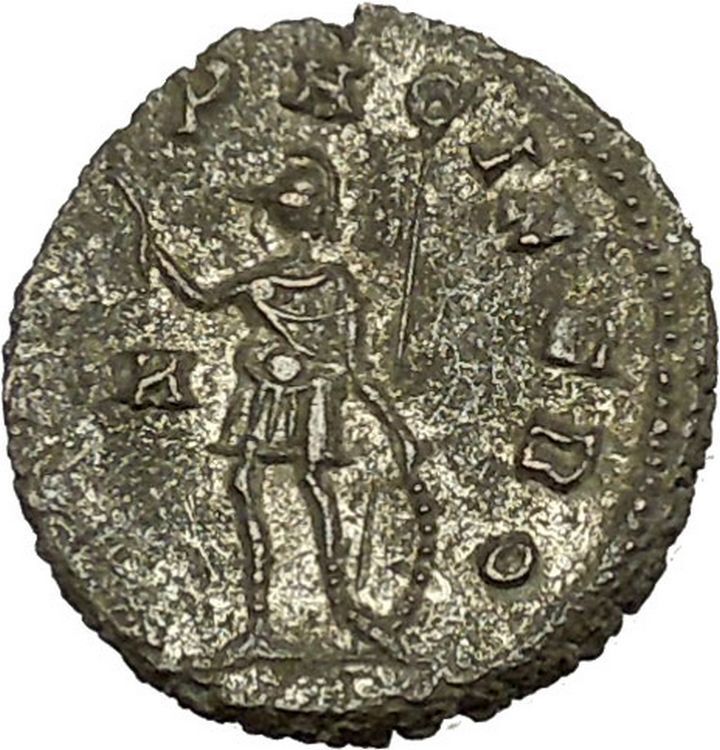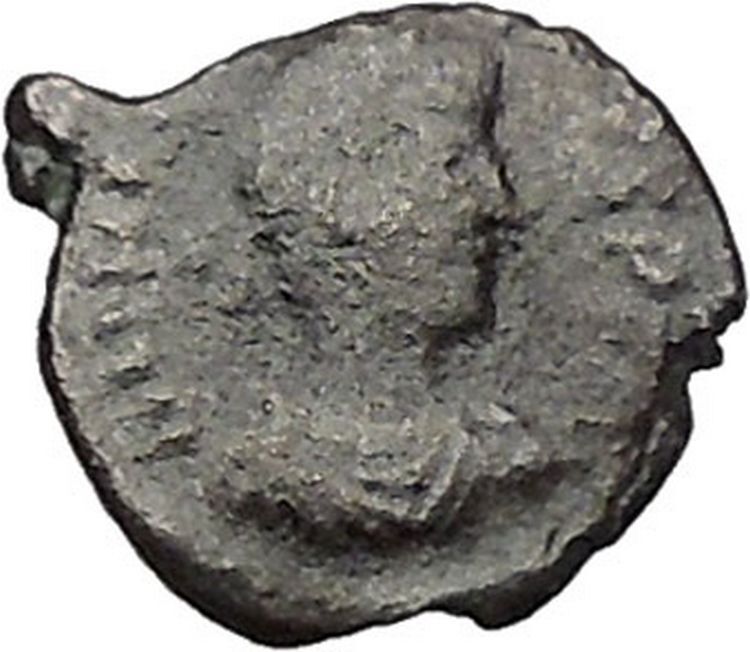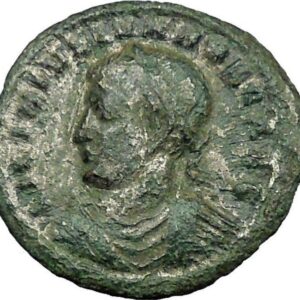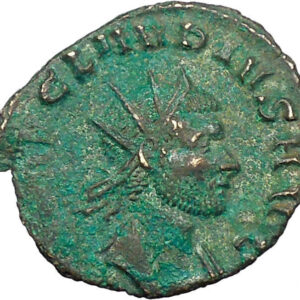|
Macrianus – Roman Usurper: 260-261 A.D. (with Quietus)<span class="mw-headline" id="History" history
<span class="mw-headline" id="History" historyBillon Silver Antoninianus 19mm (4.21 grams) Samosata<span class="mw-headline" id="History" history mint
Reference: MIR 1737k; RIC 10 corr. (star in field to left).
IMP C FVL MACRIANVS P F AVG, Radiate and cuirassed bust right.
MARTI PROPVGNATORI, Mars advancing right, holding spear and shield; star in right field.
After the capture of Valerianus I by the Sasanians, his generals of the eastern army looked for a successor to entrust with the high command of the military operations. They opted for Marcus Fulvius Macrianus who however, because of his old age conferred the power upon his two sons Macrianus and Quietus. They were therefore both raised to co-emperors in September AD 260 and were recognized in the East and in Egypt. Macrianus father and son were killed during an expedition to the West, undertaken in order to defeat Gallienus and gain sole control of the Empire; Quietus died soon after the beginning of a confrontation with Odeonathus of Palmyra who, with the approval of Gallienus, had taken over as corrector totius orientis the power in the East.
<span class="mw-headline" id="History" history
You are bidding on the exact item pictured, provided with a Certificate of Authenticity and Lifetime Guarantee of Authenticity.
Billon is an alloy of a precious metal (most commonly silver) with a majority base metal content (such as copper). It is used chiefly for making coins, medals, and token coins. The word comes from the French bille. The use of billon coins dates from ancient Greece through the Middle Ages. During the 6th and 5th centuries BC, some cities on Lesbos Island used coins made of 60% copper and 40% silver. Billon coins are perhaps best known from the Roman Empire, where progressive debasements of the Roman denarius and the Roman provincial tetradrachm.
 Mars was the Roman god of war, the son of Juno and Jupiter, husband of Bellona, and the lover of Venus. He was the most prominent of the military gods that were worshipped by the Roman legions. The martial Romans considered him second in importance only to Jupiter (their main god). His festivals were held in March (named for him) and October. As the word Mars has no Indo-European derivation, it is most likely the Latinised form of the agricultural Etruscan god Maris. Initially Mars was a Roman god of fertility and vegetation and a protector of cattle, fields and boundaries and farmers. In the second century BC, the conservative Cato the Elder advised “For your cattle, for them to be healthy, make this sacrifice to Mars Silvanus you must make this sacrifice each year”. Mars later became associated with battle as the growing Roman Empire began to expand, and he came to be identified with the Greek god Ares. Unlike his Greek counterpart, Mars was generally revered and rivaled Jupiter as the most honoured god. He was also the tutelary god of the city of Rome. As he was regarded as the legendary father of Rome’s founder, Romulus, it was believed that all Romans were descendants of Mars. Mars was the Roman god of war, the son of Juno and Jupiter, husband of Bellona, and the lover of Venus. He was the most prominent of the military gods that were worshipped by the Roman legions. The martial Romans considered him second in importance only to Jupiter (their main god). His festivals were held in March (named for him) and October. As the word Mars has no Indo-European derivation, it is most likely the Latinised form of the agricultural Etruscan god Maris. Initially Mars was a Roman god of fertility and vegetation and a protector of cattle, fields and boundaries and farmers. In the second century BC, the conservative Cato the Elder advised “For your cattle, for them to be healthy, make this sacrifice to Mars Silvanus you must make this sacrifice each year”. Mars later became associated with battle as the growing Roman Empire began to expand, and he came to be identified with the Greek god Ares. Unlike his Greek counterpart, Mars was generally revered and rivaled Jupiter as the most honoured god. He was also the tutelary god of the city of Rome. As he was regarded as the legendary father of Rome’s founder, Romulus, it was believed that all Romans were descendants of Mars.
Titus Fulvius Iunius Macrianus (died 261), also known as Macrianus Minor, was a Roman usurper. He was the son of Fulvius Macrianus, also known as Macrianus Major.
Although his father was from an equestrian family, Macrianus Minor’s mother was of noble birth and her name, possibly, was Iunia. According to the often unreliable Historia Augusta, he had served as military tribune under Valerian.
Macrianus, his father and his son Quietus, were in Mesopotamia in 260, for the Sassanid campaign of Emperor Valerian, when the Roman army was defeated, and the emperor was captured. With help from his father, who kept the imperial treasure, and by the influence of Balista, Valerian’s praefect, Macrianus gained the imperial office together with his brother Quietus, through the election by the army, in contrast with the lawful Emperor Gallienus, son and co-emperor with Valerian, who was far in the West. The two emperors and brothers were recognized in the eastern part of the Empire, having a stronghold in Egypt, the grain supplying province for the city of Rome.
After having temporarily secured the Persian frontier, Macrianus Major and Macrianus Minor moved to the West to attack and eliminate their rival Gallienus. They were however defeated in autumn 261 by Aureolus, and later killed by their own soldiers at the father’s request.
|





 Mars was the Roman god of war, the son of Juno and Jupiter, husband of Bellona, and the lover of Venus. He was the most prominent of the military gods that were worshipped by the Roman legions. The martial Romans considered him second in importance only to Jupiter (their main god). His festivals were held in March (named for him) and October. As the word Mars has no Indo-European derivation, it is most likely the Latinised form of the agricultural Etruscan god Maris. Initially Mars was a Roman god of fertility and vegetation and a protector of cattle, fields and boundaries and farmers. In the second century BC, the conservative Cato the Elder advised “For your cattle, for them to be healthy, make this sacrifice to Mars Silvanus you must make this sacrifice each year”. Mars later became associated with battle as the growing Roman Empire began to expand, and he came to be identified with the Greek god Ares. Unlike his Greek counterpart, Mars was generally revered and rivaled Jupiter as the most honoured god. He was also the tutelary god of the city of Rome. As he was regarded as the legendary father of Rome’s founder, Romulus, it was believed that all Romans were descendants of Mars.
Mars was the Roman god of war, the son of Juno and Jupiter, husband of Bellona, and the lover of Venus. He was the most prominent of the military gods that were worshipped by the Roman legions. The martial Romans considered him second in importance only to Jupiter (their main god). His festivals were held in March (named for him) and October. As the word Mars has no Indo-European derivation, it is most likely the Latinised form of the agricultural Etruscan god Maris. Initially Mars was a Roman god of fertility and vegetation and a protector of cattle, fields and boundaries and farmers. In the second century BC, the conservative Cato the Elder advised “For your cattle, for them to be healthy, make this sacrifice to Mars Silvanus you must make this sacrifice each year”. Mars later became associated with battle as the growing Roman Empire began to expand, and he came to be identified with the Greek god Ares. Unlike his Greek counterpart, Mars was generally revered and rivaled Jupiter as the most honoured god. He was also the tutelary god of the city of Rome. As he was regarded as the legendary father of Rome’s founder, Romulus, it was believed that all Romans were descendants of Mars.




